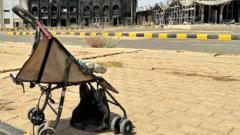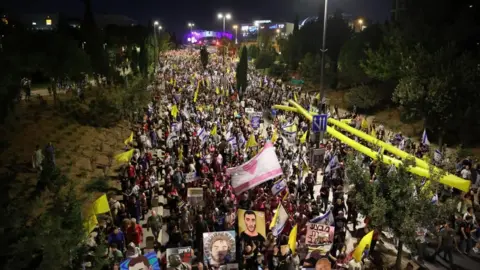The streets of Khartoum, once bustling with life, are now eerily silent, a haunting reminder of the fierce battles that have raged between the Sudanese army and the Rapid Support Forces (RSF) for the past two years. Our journey into the heart of this war-torn city comes just days after the military succeeded in retaking control, marking a decisive moment in the civil war that has already claimed over 150,000 lives.
Khartoum, a pivotal urban center housing the government, lies in devastation, characterized by burnt-out buildings, looted properties, and scorched avenues that echo a painful past. Despite the visible aftermath of conflict, pockets of celebration prompt contrasting emotions among residents, who are tentatively declaring the war's end.
The presidential palace, a critical stronghold for the RSF, bears witness to the conflict's brutality. Varied accounts from soldiers convey both pride in reclaiming the site and the sobering reality of its destruction. Amidst the wreckage, remnants of life persist; a restaurant shared festive Eid meals with soldiers, now celebrated as heroes, while the echoes of their joyful songs fill the air with an ambiance that belies the grim landscape.
Yet, the cost of this recovery is starkly evident. Khartoum's infrastructure lies in ruin, with government offices and an international airport in shambles. Unexploded ordnance litter the streets, and remnants of human tragedy are present on the very roads that once connected communities.
In this backdrop, faith plays a vital role as St. Matthew's Cathedral stands relatively unscathed, offering solace to a beleaguered population. As communities attempt to reclaim some semblance of normalcy during Eid, residents express their joy tempered by trepidation. For many, the heightened mood of festivity reflects a longing for freedom and a life unshackled by violence.
Activists and ordinary citizens alike voice their concerns for the turbulent future. Local leaders wrestle with the challenge of providing support to their communities amidst ongoing food shortages and trauma. While new hopes for national reconstruction emerge, skepticism abounds regarding the return of rights and freedoms fostered in the aftermath of the previous dictatorship.
As we navigate these moments of reflection in Khartoum’s fragile recovery, the overarching narrative remains uncertain. In the words of those emerging from the shadows of fear, a shared prayer for the safety of all impacted by the conflict resonates, particularly those in regions yet to see the cessation of hostilities.


















